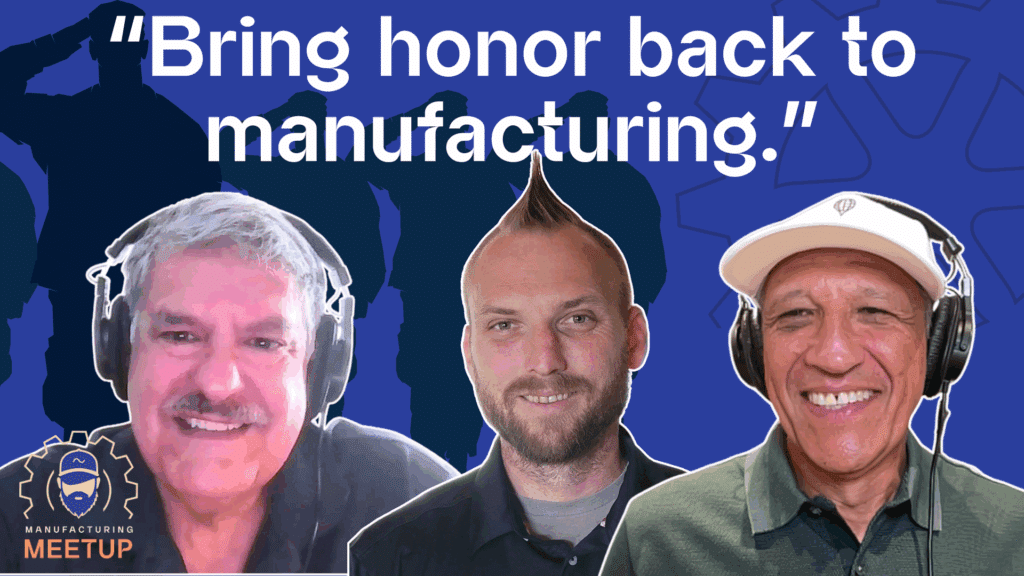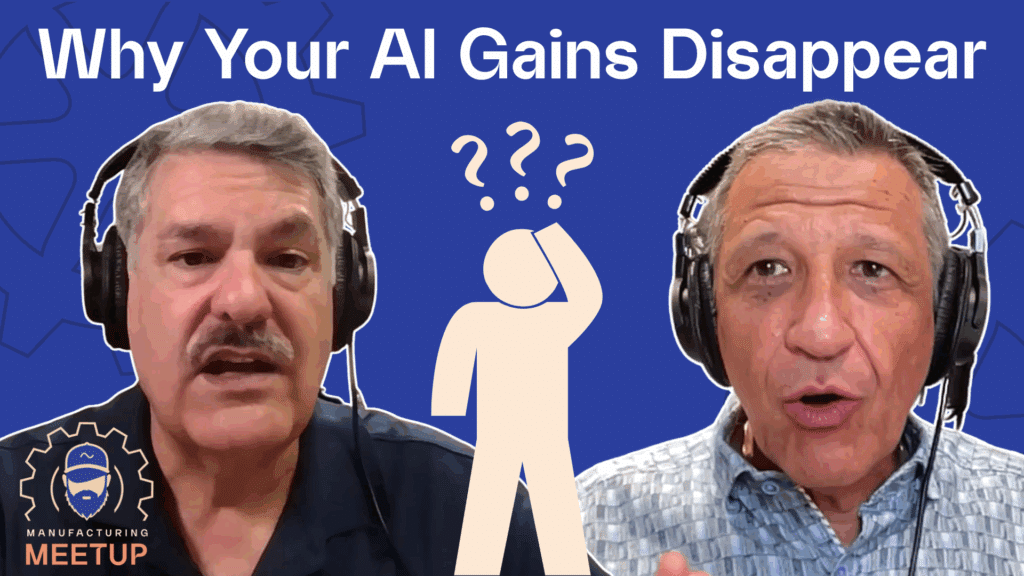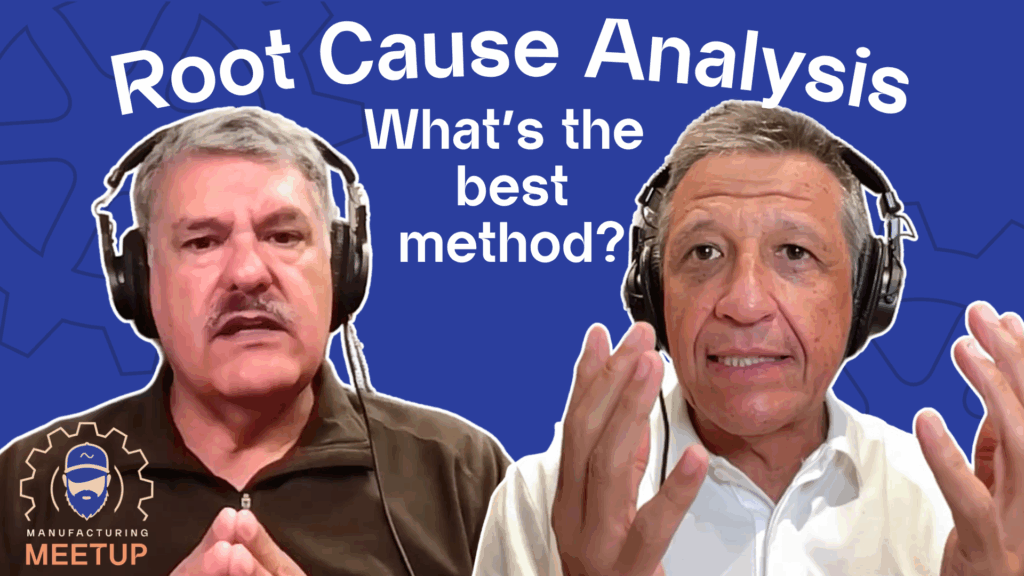Tackling Turnover with Tech and Training
It’s no secret that manufacturing is experiencing a labor shortage. In this episode, Ed and Alvaro discuss how technology and training can retain talent and attract new people to manufacturing careers.
To keep the conversation going:
Email us: mmu@augury.com
Find us on The Endpoint: endpoint.augury.com
Full Transcript
Ed Ballina: My name is Ed Ballina.
Alvaro Cuba: Hey, how are you? Alvaro Cuba here.
Ed Ballina: Good to see you, my friend.
Alvaro Cuba: Yes, great seeing you. What’s about today?
Ed Ballina: Well, I had a few things to discuss, like the Baltimore Bridge. But, for those that are watching, later on, we’re recording this on April 6. And at 10:30, about 10:30 this morning, we experienced an earthquake in central New Jersey. We’re, in the outskirts of northeast Pennsylvania, around Scranton. And we did not experience it here, but, my wife’s family is mostly in northern New Jersey. And we got lots of phone calls. Ah. it was interesting. My sister-in-law said it felt like she was in a boiling pot. She could hear this grumbling in the house, and things started moving.
Alvaro Cuba: It’s very weird. No? It’s not normal in the northeast. We lived, like, seven years there and never had any movement.
Ed Ballina: The only other one that I’ve experienced was one in Mexico City. But, about six or seven years ago, there was one in Virginia or Maryland. And I happened to be in the middle of a conference call with my plant managers. And, the gentleman that was from the Maryland plant had really some pretty poor financial results to share with me. So he’s telling me how he’s going to miss his forecast. Well, we’re on this call, right? We didn’t know anything. And he’s telling me this, and all of a sudden, he goes, “Oh my God, there’s an earthquake.” Right? And I was like, come on, really? Like, you have to, like, you know, distract me. And all of a sudden, I look at the window and the trees are moving. I go, oh, my God, you’re right. Everybody hang up. Get onto the floor. Make everybody safe.
Alvaro Cuba: So, yeah, yeah. Well, not strange to me. I’m coming from Peru. So right there, you have earthquakes. Very frequent. Sometimes, every week or something. And big ones now and then. But in the northeast, it’s clearly important.
Hey, did you also? We didn’t discuss before, but you saw the news on the jobs report, today?
Ed Ballina: Please tell me because I just read the headline. I was running and gunning this morning. I did not get a chance.
Alvaro Cuba: Impressive for the economy. And we’ll discuss it today because we added 300,000 jobs, which is 100,000 more than expected, which tells us the economy is booming and is so strong, which is good for the country. But the concerning news, and we’ll also talk about that, is that manufacturing added zero in total. So health and social services were the highest. But certainly, and our buddies here in manufacturing will, I think this will need to be, collective work on advertising, better manufacturing, and starting to get those jobs on.
Ed Ballina: But, you and I have, you and I have talked about this in the past that, you know, by our very nature and I know it’s a stereotype, but manufacturing people are not always the best salespeople. And I think that carries on to our ability to bring people into this really fantastic field. and we’re going to talk about it, in more detail a little bit. But, if it was so bad to work in manufacturing, I don’t think Alvaro and I would have stuck around for almost 40 years. And then in our retirement go back, doubling down.
Alvaro Cuba: Right, doubling down.
Ed Ballina: It’s a terrific career. It really is.
Alvaro Cuba: Okay, let’s go.
Ed Ballina: Let’s do it.
So welcome to the Manufacturing Meet Up podcast. This is our first one. We’re very excited to spend some time with you. This show is where we kick back on our downtime and get real about efficiency on the plant floor, as you’ll hear, in a few minutes. Alvaro Cuba and I both started on those factory floors, and although we kind of rose to different levels of the organization, we always had a passion for what happens in the factory. That’s where the decisions get made and that’s where the product is produced, essentially.
Alvaro Cuba: It’s the heart of the business, is the heart of any company. Yes, it has been very exciting all these years being at the very center.
Ed Ballina: So join us in manufacturing. Trust me, you’ll stay. So I’ve been in the manufacturing world for over 30 years now, and I’m now entering my second act as an entrepreneur. My sons and I started a company a year ago focusing on filler valve rebuilds, mostly for the beverage industry and also providing supply chain consulting services. I’ve got about a forty-year career in manufacturing. Started with Procter & Gamble making paper, six and a half years. Then Scott Paper, for another six and a half years. And then, in 1995 I joined Pepsico, where I had 24 great years with the company and different assignments from plant manager to VP of operations, and retired six years ago. And, like they said in the mafia movies, just when I thought I was out, they pulled me back in. I’m only too glad to report that I’m really having the time of my life doing what I enjoy and love, which is providing support to our manufacturing companies to make them more efficient and more effective and to make the life of that person on the floor just a bit more comfortable, and, less erratic. So, Alvaro Cuba, you have a great story as well.
What would you say to those guys that are thinking about going to manufacturing?
Alvaro Cuba: Before going, and to your point, what would you say to those guys that are thinking about going to manufacturing? What would be your?
Ed Ballina: Off the cuff? It’s hard work, but it’s amazingly rewarding. When you and your team can make a difference on the floor. Very quickly–I was in a plant where they were having some serious down can issues and talking to the operator. We were able to make some changes the next day when he came in. I came in about an hour and a half into his shift, and he hugged me. He said, “Ed, I was picking up down cans every two to three minutes.” He goes, “I’ve been here since six. We’ve had two. Thank you.” That means the world to me and those experiences are yours to be had.
Alvaro Cuba: Yeah, I totally agree with you. Very, very fulfilling. from my side, as I mentioned, peruvian. I studied engineering in Peru, and my very first job, at a plant–go figure out boilers and pumps, water pumps and all services and all those things. It has been a great experience for 35 years in manufacturing. Well, sort of. I started in manufacturing and, first, plants with Bunge and great, experience, and then started going into supply chain logistics. Interestingly enough, that took me to the commercial side. So I ended up in sales and marketing and, as a general manager. And then even I ended up having my own dot.com in the late nineties.
Ed Ballina: Interesting.
Alvaro Cuba: Yeah, now that we are seeing this booming technology. Well, I lived from inside the other boom until the bubble burst and, I had to go to a different thing. So I started working for Kraft Foods and, with them, had wonderful career. I lived in seven countries, visited more than 70 for work, and also, changed different industries in these global manufacturers and in local manufacturers. So I’ve been able to lucky to be like in six industries. And, then we split Kraft from Mondelez. So finished my career with Mondelez working in North America, and now I moved to Miami and, as you said, retired. But I love manufacturing. So, I continue mentoring, advising and working with a lot of guys in manufacturing. So it’s a fantastic career, and totally with you. That is the best experience I possibly had.
Ed Ballina: Yeah, I’ve heard a little bit of your travels before and your experiences and, you know, I thought I had pretty varied experiences, but I only worked in a couple of countries. so one thing I did mention at the beginning is, like you, I’m foreign born. I was born in Cuba. I came to this great country in 1971 and proceeded to grow up in Elizabeth, New Jersey, and get a degree in chemical engineering from the New Jersey Institute of Technology. but it is fascinating. I spent about a year working in Mexico with the Mexican Pepsi bottler. And that was an amazing experience because even though Spanish is my native tongue, I really have never used it in the professional world. So, I’m trying to put together a presentation. we’re doing some debut-making work, and it was hard. Ah, first of all, I didn’t know how to say filler in Spanish, right? So I’m like, so I’m asking people and say, oh, “llenador”. Okay, I got it. Right? So, even the names of the equipment, right. But when I presented to it was a senior leadership team, you know, the president and, you know, head of supply chain, and I felt like a five-year-old, right? Because my Spanish is what I spoke with my cousins and my mom when she was alive, right? You know, we speak differently when we communicate, you know, to senior executives. And I was like, my goodness, I sound like I’m ten years old. but somehow, it was an amazing experience. And, as you know, you know, Caribs like myself are not, are not terrible, lovers of spicy foods, right? Our foods, Cubans, are relatively, you know, bland.
Alvaro Cuba: Were you in Mexico?
Ed Ballina: Oh, yeah. I loved it. They turned me on to hot, spicy foods. So, yes, it’s been fun.
Alvaro Cuba: Yeah, it’s working and living in different cultures is hard at the beginning, and you feel like a child growing up again, but it’s terribly fulfilling. And, when you start understanding the culture of that country and that people, the enrichment in your life is phenomenal.
Ed Ballina No, I agree. I mean, I learned as much as I taught through my experience in Mexico. you know, about the culture, about the people, the foods, etcetera.
Alvaro Cuba: And we’ll talk about manufacturing. But on the shop floor, that is also a terrific experience. And in different countries every country does it differently. Every country has a different culture. And in getting the feeling of all of that and then sharing the best practices and sharing what one is doing and the other is in itself, a great thing to do. It’s diversity at the end.
Ed Ballina: Absolutely. And the one thing that I find doesn’t change, though, is when you get out on the floor, and you’re working with an operator, you’re working with a mechanic or a maintenance supervisor, and you’re in there getting your hands dirty with them, and you teach them, and you show them how to solve a problem. I don’t care whether you’re in a plant in Slovenia or Peru or Canada or the United States. They value the fact that you’re willing to go out there, share their experience, share their pain, and if you can take some of the pain points away, you’re a hero. People remember you.
Alvaro Cuba: Yeah, yeah. And I’m sure all the manufacturing buddies are listening to us, have their experience the first time they get into a plant or you guys, every time you are into a new plant or change plants. Yeah. It’s a learning experience as well. Not only for them, but for every one of us.
Ed Ballina: Absolutely. And you have to prove yourself. and I will tell you some of the toughest people to prove yourself with are maintenance mechanics. Right? they’re like, oh, oh, so you’re like some hot shot that is going to show me how to do things that I’ve been doing for 20 years.
Alvaro Cuba: they give you a wrench and send it to the machine. Until you don’t demonstrate, you don’t get trust.
Ed Ballina: And fortunately, a lot of this hazing doesn’t go on as much anymore. But I remember in paper making, a new operator would come in and, you know, the more seasoned tech to be. Hey, listen, you see that bucket? Go grab that bucket. Give me a bucket of steam from the steam turbine, floor. Some people would pick up the bucket and go walk downstairs to go get their bucket of steam. Right?
Alvaro Cuba: Yeah.
Ed Ballina: Some really fun stories of, the shenanigans, the funny, safe shenanigans that go out on our shop floors. We’ll keep it at that, and we’ll.
Alvaro Cuba: Talk more about today. So what about. You and I talked about the transition from COVID to productivity. Let’s go to our topic.
Ed Ballina: So I think it’s a perfect takeoff on the job report, right?
Alvaro Cuba: Yeah.
Ed Ballina: You and I were talking about this maybe a couple of weeks ago, and, you know, this is kind of weird. If we step back a little bit, you and I talked about the transition over the last couple of years where, you know, during COVID-19, it was all hands on deck, every case out the door, not regardless of cost, but with a focus on product supply, because we experienced things that I had never seen before, I would just say after leaving Cuba, which is empty store shelves. Right?
Alvaro Cuba: Yeah.
Ed Ballina: I mean, for people that have grown up in the United States over the last 40, 50 years, that is like, what is going on? There’s an empty spot on the gondola and King Soopers or HEB or whatever you shop. So big push. We have to get it out the door because they had to feed our consumers, people like you and I. Right. Well, during that time, because of inflation, a lot of companies took pricing. Some of the pricing hasn’t held. Some of the volume has slipped back. And now the big rallying cry is about productivity. Right. It’s not every case is worth producing. Kind of. Right. Or has to justify itself because we have, in some cases, excess capacity, and the costs have ballooned, and the consumer isn’t that willing to absorb that much. So you have that going on, that transition, and then you hear the great job reports, and you and I, on the surface, we’re like, hey, the numbers look really good, right? But yet you and I know the reality that we see in our plants, where most facilities I go into are down 15% to 20% on maintenance technicians or kind of that mechanical skilled labor. We’re still not fully, populated with operators. Right. so it’s weird.
Alvaro Cuba: Every job across the board, it’s being challenged. Manufacturing is expected to grow 3% starting 2025, according to analysts. That’s not the only thing that is changing. It’s changing the timing. Is full economy on one hand. But how come if it’s full economy, we are seeing so much vacancies in the plant. But there is also a couple of things that are changing. in addition, one is the increasing volume. No, the production back in America is now full-blown. And also, as I mentioned when we were talking, manufacturing is expected to grow 3% starting 2025, which is coming back to the growth moments. And, the other thing that is changing is the people. Because during the pandemic, everyone was in their homes and everyone was used to the computer, and things. And now people are thinking about not only the job that they had, but what other experiences are out there. What else can I do? I can probably work from home. Probably I can travel, right? No. And, this also changes the demographic of the people that we need to bring into the plant. No, it’s people that want much more experience, much more exposure, and fun. And also they want a purpose.
Ed Ballina: Right.
Alvaro Cuba: And so I think all these paints, fairly, good picture, of what I’m sure everyone that is listening to us in the plant is experiencing. So all the news is here. The reality on the shop floor is different. And when you talk to the people in the plants, I’m sure you are doing, and our listeners as well, the people in the plant are telling you what’s new, what’s next. How is this going to change? That’s internally and externally, people is also asking themselves the same questions. So.
Ed Ballina: Absolutely. I think the pandemic, might have forced a change in the focal point of people. How they balance their professional career, the financial rewards that come with it, and maybe their exterior life and their families and all that. and the working from home, I think, also provided people with a view to a different reality of work. But I also think part of the reason why we’re seeing some of these discrepancies is because you can hardly pick up a newsfeed and not find that a company laid off 1000 people, or they, which was the 99-cent store I heard about this morning, they are closing every single one of their stores. They’re done. Right.
Alvaro Cuba: So Dollar General also announced that, and then.
Ed Ballina: But I think, yeah, I think part of. No, you find out. I think part of what we’re experiencing as well is that companies are harnessing technology, right? To automate and reduce their labor costs. Right. Labor costs have gone up significantly. And I hate to use this example because there are all kinds of rethinking of this today, but the self-checkout right in our stores, where you no longer have a cashier, you scan yourself. And the jokes that Walmart needs to pay me benefits because I’m doing their work. But what happens is that automation is liberating folks that should be available to fill some of the needs that we have in manufacturing. But I think we have a couple of issues. One is the skill set that is, you know, required in manufacturing continues to go up. And you and I are going to dig into this a little bit because we do think that one of the ways to help this problem is through technology. But if you’re being, eliminated essentially as a cashier. Right, but what I need are electrical technicians or a data scientist, or not even a scientist, but somebody can deal with databases and all that. The skills that you have and the skills that we need are not well aligned.
Alvaro Cuba: Yes.
Ed Ballina: And that’s where I think we need to, as a country, maybe invest a bit more on re- education and capability development, so we can fill.
Alvaro Cuba: Those needs but I think. Totally agree.
Ed Ballina: Yep.
Alvaro Cuba: But also, I think we need to work on rebranding the manufacturing job. No, because before, we need to think about how we attract people. You said it; there is all these people going out of these jobs. But the report today, it was saying zero going into manufacturing. So, one of the things is how we rebrand, you and I know, and we come, even in our times, it has been changing and improving. But the picture of the manufacturing being a difficult job. Dirty and difficult and sometimes unsafe and, all the time running here and there, knowing sometimes binge. Yes. space.
Ed Ballina: Hey, you and I, and I want to hear your experience, but I have literally walked through stinking, putrid pulp that overflowed my shoes. Okay. That I couldn’t even stand myself when I sat in my car the next day. Okay. I’ve got into some dingy, dingy basements where there were cockroaches that were as big, I mean, not in food or anything. Right. But cockroaches that were bigger than a household cat. But you know what? Yes, some of those still exist, but not necessarily.
Alvaro Cuba: And it’s not necessarily the world we are going. You are mentioning technology. I think we are still far from technology taking jobs out of manufacturing because you continue to go to the plants as well as I do, and we still see people running around. You mentioned this example about the person saying thank you, because it only had two battles, right? No. they go after instead of many more. I clearly recall, a plant that the line was stopping every minute and everything was firefighting and the operators and the mechanics and risking and all that. So technology helped us in that example. It was in Mexico, actually, in one of our plants in Mexico, with training on the people and technology, we start taking that line to ten minutes and then to 1 hour and then to 2 hours. When we started doing that, the people in the line started having time to breathe first and then to think, and then to start doing many very fun and engaging activities because they were not. I remember the first time doing TPM, the first time that the Japanese came from the Japanese technician institute. He said the operators seem like they cannot be slaves of the machines. Yes, no, I’m sure you have heard that, but I think right now we have a golden opportunity with technology in everything, in machine health, in process health, in data collection, in all those things. Technology can help us.
Ed Ballina: Absolutely.
Alvaro Cuba: And give that time back to the operators, to the mechanics. So they can travel to see other machines in other places. They can talk to suppliers, they can go to the shelf and see what consumers are seeing in their products. No, they can exchange among them. They can go to the market. Technology allows operators to do more than just stand down containers every three minutes There are many things that not only will be fulfilling, but also where they can continue to learn.
Ed Ballina: It’s a much more enriching career when you can do more than just be that packer operator that has to stand up down containers every three minutes because this machine shuts down. and, we used to call it the hotel, you know, again, the manufacturing picture it’s out there is. It’s like the Eagle song Hotel California. Okay, you can check in, but you don’t always know when you’re going to check out. I’m sure everyone that’s, you know, listening to this, to this podcast has had the experience where you come in 7:30, 8:00 in the morning or earlier, and you’re trying to start up a process or a machine or a line, and you’re there 24 hours later. Right. Because you have the commitment to make sure that it starts out, you don’t do that. It’s part of the job.
Alvaro Cuba: But you are seeing, and I’m seeing now, lines that run 3 hours, 4.
Ed Ballina: Hours without a stoppage.
Alvaro Cuba: And they stop the machine to do something in the machine versus the machine stopping to you.
Ed Ballina: Exactly.
Alvaro Cuba: No.
Ed Ballina: And who’s the boss? Is the machine the boss, or are you the boss?
Alvaro Cuba: And then the mechanics can plan what they are going to do when they need to do, and the operators can do other things. No. So, that is one of the components that I think technology can bring to, to the table. And, I’m sure everyone in your plants, you are seeing this, in, a small scale or in a big scale, but I would invite you to look and try to get those experiences, because I start to see, I don’t know you, Ed, but I start to see these lines and these plants that look completely different, clean and organized and not firefighting. And people involved not only in the production, but also in how to improve the production and how to innovate in all that. I’m sure you are seeing that as well.
Ed Ballina: I had a really interesting call a few days ago with a company that makes packaging equipment, which happened to be the soda industry. And they were talking about what their vision is of the future. And it was really cool. So we were talking about having multiple cameras over the machine. And you and I know that one of the biggest aggravators, if you’re a packer operator, is to go pick up down containers at the end feed, right? Especially if they happen over and over again. And their idea was they would have cameras on the infeed, cameras on the transfer chains, right? All connected to a predictive maintenance platform. It happened to be Augury, and where the machine would connect it to an AI. The machine would recognize that every three minutes, you’re having a down can here at the infeed, and then it correlates that to another camera upstream. That shows you that when you go across this dead plate, your cans wobble and sometimes weeble wobbles, and they do fall down. Right. I mean, just the potential of that right now, that we shouldn’t be fixing down cans immediately. But you know, that takes so much pain away from the operator. And the point that you made about what the Japanese technician said is spot on when your operators are part of the machine, right? So they’re fixing jams, and they’re, you know, cleaning up scrap product and all that. They’re not really operators. An operator in a good line should be observing, looking for opportunities, and looking for how to improve processes. Not that they are standing up a down container every three minutes that nobody likes to run a crappy line. Right. And technology is there to help change the game.
Alvaro Cuba: Yeah, and technology, you mentioned an example, it’s not the technology. Complicated technology of the previous iterations of technology were very difficult to install, took a lot of time, and had a lot of approval. System changes and all that. Right. Now for the machine health or the process health, you just go glue a sensor, you WiFi it to AI, analysis, and then you get, even in your mobile, you get the status of the entire line or whatever machine you are monitoring. It’s starting to become very easy and very easy to access.
Ed Ballina: So, I reconnected with an old colleague, from my P&G days, and she mentioned to me, this company that she, I think her husband’s involved in. Anyway, they make a railroad cart, right, that they literally put on the tracks and it’s got sensors all over it. They check the dimensions of the rails as it rides over it, right? Looking for wear, looking for cracks. They check overhead with sensors to make sure that there aren’t any tree branches that are going to hit the trains. I looked at that and said, oh my God, can you imagine the impact that that’s going to have on railroad safety, on preventive maintenance? I mean, it really is very credible. I mean, the use of drones now. Right. I have a cousin that worked for, he was the CIO for a sugar company in Central America, and he was sharing with me information, like, hey, we use drones to precise application of fertilizers and whatever other elements they add when they harvest sugarcane, that sugarcane is harvested at the peak of its yield, and it is tracked all the way until it gets into the Ingenio. So they maximize the sugar yield, and it’s all done, you know, in the cloud. Yeah. Oh, it is impressive as heck. Right?
Alvaro Cuba: Well, just. Just drive a Tesla. You see on your screen the people that are the silhouettes of the people that are walking in the walkway. And even color-coded.
Ed Ballina: Yes.
Alvaro Cuba: No. If it’s green, it’s no danger. If it’s red, it may be danger. No.
Ed Ballina: So a lot it’s there. And I think, getting back to how do we address someone’s problem manufacturing? I do believe a huge percentage of it is image. Right. Going back to your comment, we have an image of a dirty, grungy place. You work a bazillion hours. If you’re in the beverage industry, we always talk about the 100 days of summer, right? That is literally from roughly Memorial Day to Labor Day, where we do a ton of volume. Right. Summertime. And you just kind of run. You know that you may be in the plant on a July 4. Right. And those are some sacrifices, but they’re getting less and less. And I think the opportunity to be a part of this American manufacturing renaissance is a once-in-a-lifetime opportunity. I am thrilled to see manufacturing coming back to the US.
Alvaro Cuba: And then the other point, that you mentioned at the beginning, technology is a big help these days, and you should check it out, guys. the second is training. And you mentioned at the beginning if we are going to capture that people, we need to train our people first internally for the new technology, but then we need to train the people that are coming from outside. And there are several ways that companies are finding now to train. College is not needed. High tech, high tech is needed. And there are different ways to get that. Internally, you can train. I remember in one of our operations, we were training the people internally in small labs that they themselves helped. And they became so good that at some point, one university asked them if they could bring the students to be trained in that. And guess who were the teachers, the operators, and the mechanics that were trained in those labs. So that’s an easy way. And the other that I keep thinking is, if the people that are coming from outside. Probably does not know a lot about manufacturing in the line. In these days, they are tech savvies.
Ed Ballina: Yes. Right.
Alvaro Cuba: No. And it’s very easy. If they are tech savvies. And they are not afraid of the computer, the machine, or the sensor. And they can interact; that’s a big jumpstart.
Ed Ballina: Absolutely. And look, the technology is meeting us where we live, right? Because there are a number of manufacturing, I call information systems. That feeds right into this little monster that we carry in our pockets. This computer that we call a phone, is incredibly powerful. And everybody has one. I mean, I remember when cell phones kind of started coming on the shop floor. I was like, oh, we can’t have that here. Good luck trying to stop cell phones on the shop floor. now you have to manage it.
Alvaro Cuba: Some more than stop them, use them.
Ed Ballina: Absolutely. No, absolutely. Because, sorry. You can get. No, you can get. As we all know, many of our devices and reporting systems have mobile capabilities. So you could literally be walking around the plant and receive a notice on your phone that says, hey, we have detected a high-range vibration on your fan, x, y, and z. And we think the probable cause is your fan blades are dirty. So it’s unbalanced. Here’s what we. Here’s the fix. Shut down, clean the fan blade, and start back up. And by the way, after you start up. You get a message that says your vibrational level is back to normal. I mean, that’s right. That beats the heck out of the old-fashioned way of your fan gets dirty, goes out of vibration.
Alvaro Cuba: Imagine that example. Anyone from outside that you tell them that they are going to work in that environment. It doesn’t sound tempting. Yeah, I want to go. Yeah, it’s, it’s in my mobile. It’s different than before. And then you can use also the technology for the training.
Ed Ballina: Right?
Alvaro Cuba: I’m sure you are familiar in in with the buddy system. And you enter a new role. You have another person to accompany you. And go with you to every place and all that. Now, with the mobile, you can do it even with someone in another plant.
Ed Ballina: Absolutely.
Alvaro Cuba: That operates a machine that is identical or similar to yours.
Ed Ballina: Right.
Alvaro Cuba: And can become your buddy. And can tell you, do this, do that. Watch out for this. Watch out for that. Any questions? No. You can even watch in the camera what’s happening. So technology as well is a great enabler. and a great facilitator to train the people, the internal people, and the people that we want to hire.
Ed Ballina: Absolutely. I’ve experienced it in the early stages, but the use of smart glasses to troubleshoot equipment. Right. In the beverage industry, a lot of our OEMs, are headquartered in Europe, and it’s not easy to always get them across. We started using smart glasses where a technician can actually look at a piece of equipment, and the technician back in Parma, Italy, is looking at the same thing and can actually project on the screen an arrow. Hey, see this right here? Go check the clearances on, this transfer, etcetera. So they’re hearing it auditorily. The technician department is seeing what our technician is seeing and is directing them. I mean, that is only going to grow, and that really helps shortcut the repair process and the meantime to repair. So even. And people learn, right? Adult, the adult learning model requires we learn differently than children. Right. When you’re an adult, school children, we teach them the theory first, and then we have them execute. Adults learn the other way. So, very powerful technology that I think is just starting to blow up.
Alvaro Cuba: Yeah, yeah. So once, once we put all these together, so we were saying, change the image of the, of the manufacturing role, and that’s something that we all should be doing, not only in the plant and with the people that we are trying to hire in our day to day, with our families, with everyone. We need to help change this. So that change first, technology is becoming a big enabler, and the speed that is progressing and, and the things that are coming every day, a new thing on technology. And with AI, that’s going even to accelerate more. And then on the third in the training is all these possibilities of training that the technology can also bring. So when we put those three together, we can, going back to the report that we said no. So, yeah, it’s true that there is a lot of change. I was reading that 50% of people in general, in all industries, in manufacturing, in everything, are thinking about changing roles. So what’s that is they want new experience, they want fun, they want a purpose, right? And we have to offer them exactly that. No, possibilities to train, possibilities to engage, possibilities to travel. We were saying we are the heart of the company, so if we do that, we should be able to attract all the people who are going out of those companies or jobs into engaging, fun, purposeful roles in manufacturing. But we have to do it all together.
Ed Ballina: Guys, folks, it’s a great career, right? I’ll repeat it again, maybe more. In the vernacular, if, it stunk so bad, this guy and I would not have stuck around for darn near 40 years and then come back because we didn’t get enough. We wanted more. and the ability to mentor people. Right. I mean, when I get a phone call from somebody that I have absolutely no influence over anymore, right? I’m no longer the vice president of this, right? And they’re calling me up to ask for advice or bounce something off of me. My God, does that make my heart swell? It makes me feel like I was able to help. I made a difference. And these people have nothing to gain from me anymore. And they still call me, wow, maybe they like me. I sure did fool them.
Alvaro Cuba: I’m sure they like you, my friend. I’m sure they like you. It has been great conversation and I think we leave you guys with these three messages. Let’s all together try to change the image of manufacturing that is changing. Second, let’s try to use technology as much as possible, as simple as the mobile and from there. And the third is to recruit. Let’s use also technology and let’s be creative. I think that mismatch could be a problem, but it could be an opportunity if we recognize the skills that the people who are coming in are bringing with them. Mixing that with technology should do the trick. And with that, I hope that we start getting more and more people into the shops and you guys start, well, focusing more on innovation and, mentoring and helping people in the plants.
Ed Ballina: And, by the way, the pay isn’t half bad either. Okay.
Alvaro Cuba: No, it’s a great point, by the way. Normally, the starting point. All the rest goes on top of that.
Ed Ballina: Exactly.
Alvaro Cuba: Okay, great. It has been a great podcast. Thank you. To wrap up the episode today, just join the manufacturing meet up. If you have friends, invite them. This is a big community, is not Ed and I. This is everyone that works in manufacturing. This is the idea of meeting up. If you like the episode, please give us a review if you are in iTunes or like us, if you are in YouTube. And please share the podcast.
Ed Ballina: Agreed. This has been a lot of fun. If you like to keep this conversation going, you can email us at MMU@augury.com. So again, that’s MMU@augury.com. Or find us on the Endpoint. it’s a free online community for manufacturing pros at endpoint dot augury.com. we’ll also have those links in the show notes for the episode. So hopefully we’ll see you next time.
Alvaro Cuba: See you guys next time. And great talking to you, amigo.
Ed Ballina: Same here, my friend.
Meet Our Hosts

Alvaro Cuba
Alvaro Cuba has more than 35 years of experience in a variety of leadership roles in operations and supply chain as well as tenure in commercial and general management for the consumer products goods, textile, automotive, electronics and internet industries. His professional career has taken him to more than 70 countries, enabling him to bring a global business view to any conversation. Today, Alvaro is a strategic business consultant and advisor in operations and supply chain, helping advance start-ups in the AI and advanced manufacturing space.

Ed Ballina
Ed Ballina was formerly the VP of Manufacturing and Warehousing at PepsiCo, with 36 years of experience in manufacturing and reliability across three CPG Fortune 50 companies in the beverage and paper industries. He previously led a team focused on improving equipment RE/TE performance and reducing maintenance costs while improving field capability. Recently, Ed started his own supply chain consulting practice focusing on Supply Chain operational consulting and equipment rebuild services for the beverage industry.




